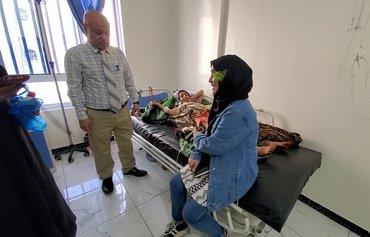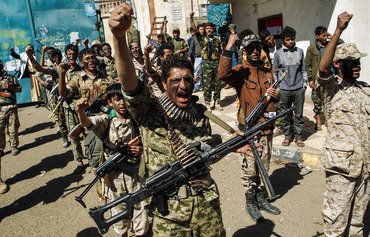Human rights violations against civilians in Yemen continue to rise as the Iran-backed Houthis (Ansarallah) persist in their fight against the legitimate government, according to the National Commission to Investigate Alleged Violations to Human Rights in Yemen (NCIAVHR).
NCIAVHR investigated 2,940 incidents of human rights violations in Yemen over the past year, and published the results in its latest August 30th report.
The investigations covered 30 types of violations against a total of 6,163 victims, the commission said.
Investigators interviewed 14,983 witnesses and victims and verified their testimonies. They also reviewed 14,265 documents and analysed hundreds of photographs and videos related to these incidents.
Investigations were done across all provinces of Yemen.
Houthis top list of violators
Investigations revealed the Houthis top the list of human rights offenders in Yemen.
The violations documented include the killing and wounding of 1,647 civilians, the NCIAVHR said.
Of the 712 civilians killed, 66 were women and 122 were children, the report said. Out of 935 civilians wounded, 113 were women and 247 were children.
The Houthis are responsible for killing 321 civilians and wounding 735, according to the NCIAVHR.
The commission also looked into 21 bombings and attacks on cultural and historical monuments.
The Houthis were responsible for 16 of the attacks, the investigations showed, while government forces and coalition aircraft were responsible for four incidents, and government forces and the Houthis shared responsibility for one incident.
Nine attacks on medical personnel and health facilities were also investigated.
The report documented the recruitment of 126 children and 85 incidents of laying mines, all of which were committed by the Iran-backed Houthi militia.
It also documented 271 incidents of forcible displacement, 109 of which were committed by the Houthis, 152 by Security Belt Forces and 10 recent incidents by other parties.
The commission looked into 1,304 claims of arbitrary arrest and forced disappearance and concluded that the Houthis are responsible for 1,055 incidents. The government and parties affiliated with it are responsible for 239 incidents, while other parties are responsible for 10 incidents.
It also investigated 55 incidents of extrajudicial killing.
Commission committed to transparency
The NCIAVHR report aims to inform the public about the commission's efforts to reach victims, identify responsible parties and make efforts to hold those parties accountable.
NCIAVHR chairman Ahmed al-Maflahi said the commission is committed to transparency, independence, impartiality, objectivity, professionalism and confidentiality.
Regardless of ongoing political events and the difficult situation in Yemen due to the COVID-19 coronavirus outbreak, the NCIAVHR has remained committed to conducting its investigations with transparency, he said.
"We have researchers, including lawyers and jurists, working in all provinces, including Houthi-controled provinces," said NCIAVHR member Ishraq al-Maqtari. "They meet victims and witnesses, inspect the sites where violations took place, and prepare files on the cases."
"As armed groups always do, the Houthis use coercion to impose their hegemony, forcibly repress people and subject them to their authority," she said.
"Residents' extreme poverty undoubtedly makes them more vulnerable," she added.
Violations rise amid war
Despite pressure from international organisations, human rights violations are escalating after five years of war, said human rights lawyer Huda al-Sarari.
"The Iran-backed Houthi militia commits some of the most heinous crimes against humanity, namely forced disappearance," she told Al-Mashareq.
The suffering of the families of the forcibly disappeared is compounded by "the difficulty of searching for their sons who were hidden in Houthi prisons, to no avail", al-Sarari said.
"Some mothers only want to know whether their missing son is alive," she said. "They ask to be handed the remains if they are dead."
The international community has a moral and legal responsibility to hold human rights violators accountable and redress victims' grievances, said Abdul Rahman Berman, a lawyer and human rights activist.
"As long as the commission monitors and documents, the day will come when the criminals will be put on trial," he told Al-Mashareq.

![Yemenis gather at the site of a suicide car bombing on a police station in Sheikh Othman district in Aden, on August 1st, 2019. Separate attacks by the Houthis and a suicide bomber that day killed at least 27 people in Aden, many of them newly trained police cadets. [Nabil Hasan/AFP]](/cnmi_am/images/2020/09/09/25981-Yemen-houthi-attack-600_384.jpg)






